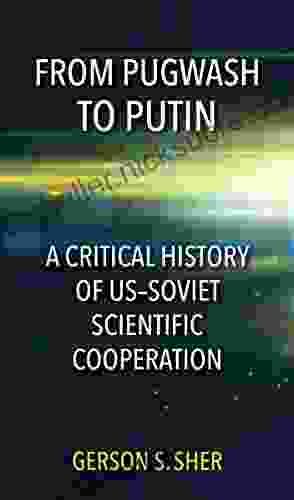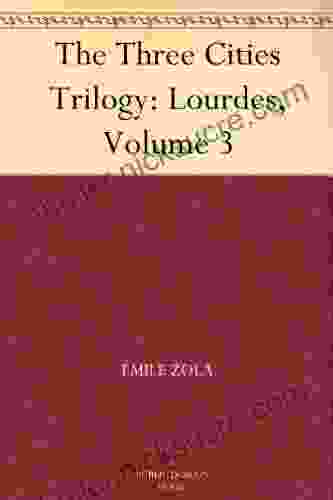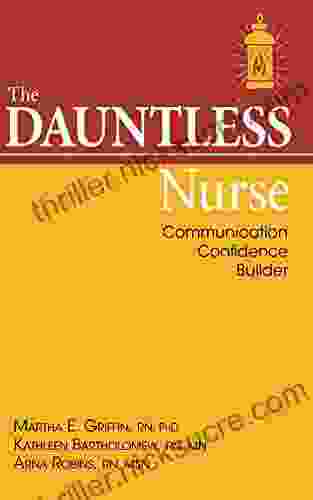A Comprehensive Exploration of the Critical History of US-Soviet Scientific Cooperation

The relationship between the United States and the Soviet Union, marked by both animosity and unexpected collaborations, was particularly evident in the realm of scientific research. Despite their ideological differences, the two superpowers recognized the transformative potential of science and technology and made concerted efforts to advance scientific cooperation. This article delves into the critical history of US-Soviet scientific cooperation, shedding light on its origins, key milestones, and the lasting impact on scientific and technological progress.
Origins and Motivations
The seeds of US-Soviet scientific cooperation were sown during World War II, when the Allied powers joined forces to combat the Axis threat. The Manhattan Project, a top-secret American effort to develop the atomic bomb, involved the exchange of scientific knowledge and resources with the Soviet Union. This cooperation was based on the shared goal of defeating Nazi Germany and hastening the end of the war.
5 out of 5
| Language | : | English |
| File size | : | 2625 KB |
| Text-to-Speech | : | Enabled |
| Screen Reader | : | Supported |
| Enhanced typesetting | : | Enabled |
| Word Wise | : | Enabled |
| Print length | : | 324 pages |
| Lending | : | Enabled |
After the war, the pursuit of scientific advancement became intertwined with the Cold War rivalry. Both the US and the USSR recognized that technological superiority could confer significant strategic advantages. This led to a surge in government funding for research and development, with science becoming a proxy battleground between the two superpowers.
Key Milestones in Cooperation
Throughout the Cold War era, there were several notable milestones in US-Soviet scientific cooperation. These included:
* 1955: Exchange of Atomic Scientists - In a historic move, the US and the USSR exchanged atomic scientists to share knowledge on the peaceful uses of nuclear energy. * 1957: Launch of Sputnik - The successful launch of Sputnik, the first artificial satellite, by the Soviet Union sparked a space race and renewed interest in scientific cooperation. * 1959: Antarctic Treaty - This treaty established Antarctica as a continent dedicated to scientific research and prohibited military activity. It fostered international scientific collaboration, including between the US and the USSR. * 1962: Cuban Missile Crisis - The near-catastrophic Cuban Missile Crisis highlighted the risks of nuclear warfare and led to renewed efforts for arms control and scientific cooperation. * 1972: Apollo-Soyuz Mission - This joint space mission symbolized a thaw in US-Soviet relations and demonstrated the potential of scientific collaboration to bridge political divides.
Technological Achievements and Impacts
The US-Soviet scientific cooperation yielded significant technological advancements that shaped the modern world, including:
* Space Exploration - The space race led to breakthroughs in rocketry, satellite technology, and human spaceflight. The Apollo-Soyuz mission paved the way for future international space cooperation. * Nuclear Energy - The exchange of knowledge on nuclear energy between the US and the USSR contributed to the development of nuclear power plants and medical applications of radiation. * Climate Research - The Antarctic Treaty facilitated international scientific collaboration on climate change, leading to a deeper understanding of Earth's climate system. * Medical Collaboration - There were joint efforts in research on infectious diseases, cancer, and other medical advancements that benefited both countries.
Challenges and Tensions
Despite the achievements, US-Soviet scientific cooperation was not without challenges and tensions. These included:
* Ideological Differences - The fundamental ideological differences between the two superpowers often hindered scientific collaboration and led to mistrust and suspicion. * Security Concerns - Concerns about espionage and the transfer of sensitive technologies made it difficult to share some scientific information. * Political Instability - The volatile nature of US-Soviet relations, particularly during periods of heightened tensions, impacted scientific cooperation.
Legacy and Impact
The critical history of US-Soviet scientific cooperation has left a lasting legacy on modern science and technology. The exchange of knowledge and resources between the two superpowers accelerated scientific progress and led to significant technological advancements.
Today, international scientific cooperation continues to be essential for addressing global challenges and fostering understanding. The lessons learned from the US-Soviet experience provide valuable insights into the potential and challenges of scientific diplomacy.
The critical history of US-Soviet scientific cooperation is a complex and fascinating chapter in the annals of scientific advancement. Despite the geopolitical tensions and ideological differences, the two superpowers recognized the transformative power of science and made concerted efforts to collaborate. Their cooperation led to significant technological achievements, strengthened international scientific ties, and paved the way for future scientific endeavors. By understanding the history of US-Soviet scientific cooperation, we can better appreciate the importance of scientific diplomacy and the potential of international collaboration to drive progress and benefit humanity.
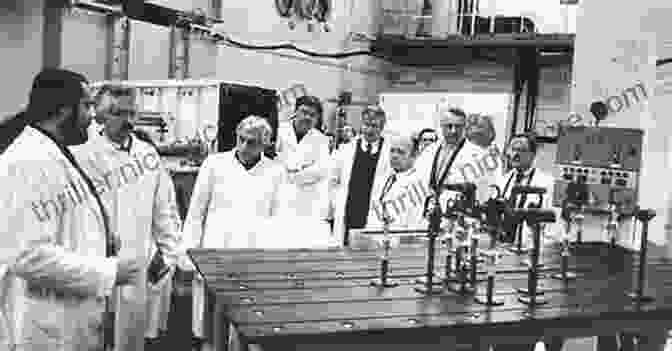
5 out of 5
| Language | : | English |
| File size | : | 2625 KB |
| Text-to-Speech | : | Enabled |
| Screen Reader | : | Supported |
| Enhanced typesetting | : | Enabled |
| Word Wise | : | Enabled |
| Print length | : | 324 pages |
| Lending | : | Enabled |
Do you want to contribute by writing guest posts on this blog?
Please contact us and send us a resume of previous articles that you have written.
 Fiction
Fiction Non Fiction
Non Fiction Romance
Romance Mystery
Mystery Thriller
Thriller SciFi
SciFi Fantasy
Fantasy Horror
Horror Biography
Biography Selfhelp
Selfhelp Business
Business History
History Classics
Classics Poetry
Poetry Childrens
Childrens Young Adult
Young Adult Educational
Educational Cooking
Cooking Travel
Travel Lifestyle
Lifestyle Spirituality
Spirituality Health
Health Fitness
Fitness Technology
Technology Science
Science Arts
Arts Crafts
Crafts DIY
DIY Gardening
Gardening Petcare
Petcare Avery Faigenbaum
Avery Faigenbaum Kent Hoffman
Kent Hoffman Jeannie Burlowski
Jeannie Burlowski John Mclachlan
John Mclachlan Lee Alan Dugatkin
Lee Alan Dugatkin Victor A Bloomfield
Victor A Bloomfield Cal Pater
Cal Pater Mark William
Mark William Brian Everitt
Brian Everitt Grace Friedman
Grace Friedman Lisa Leake
Lisa Leake Ernle Bradford
Ernle Bradford Nora Roberts
Nora Roberts Dr Faith G Harper
Dr Faith G Harper James Dean
James Dean Elizabeth Dupart
Elizabeth Dupart Patti Henry
Patti Henry David Levithan
David Levithan Karen Ward Mahar
Karen Ward Mahar Don Brown
Don Brown Colleen Houck
Colleen Houck Luis Preto
Luis Preto E G Richards
E G Richards Nicholas Gallo
Nicholas Gallo Mariana Monteiro
Mariana Monteiro Vincent W Davis
Vincent W Davis Megan Smolenyak
Megan Smolenyak Judy H Wright
Judy H Wright Dr Monique Thompson Dha Lpc
Dr Monique Thompson Dha Lpc Inge Bell
Inge Bell Guy P Harrison
Guy P Harrison Scott Hawthorn
Scott Hawthorn John Bradshaw
John Bradshaw David Barrett
David Barrett M A Hayat
M A Hayat Brittany Cavallaro
Brittany Cavallaro Chase Hassen
Chase Hassen Esther Hicks
Esther Hicks Douglas R Hofstadter
Douglas R Hofstadter Zigzag English
Zigzag English Denise Long
Denise Long Mark Seemann
Mark Seemann Mike Adams
Mike Adams Tom Cunliffe
Tom Cunliffe Ted Franklin Belue
Ted Franklin Belue Joel Ingersoll
Joel Ingersoll Sonja Schwartzbach
Sonja Schwartzbach 1st Ed 2018 Edition Kindle Edition
1st Ed 2018 Edition Kindle Edition Jay H Lefkowitch
Jay H Lefkowitch Laurie A Watkins
Laurie A Watkins Daniel Bergner
Daniel Bergner Joe Grant
Joe Grant Elsevier
Elsevier Christy Teglo
Christy Teglo Judith A Owens
Judith A Owens Lenore Skenazy
Lenore Skenazy Piero Ferrucci
Piero Ferrucci Grace Mariana Rector
Grace Mariana Rector Chukwuma Eleodimuo
Chukwuma Eleodimuo William Souder
William Souder J C Cervantes
J C Cervantes Jackie Freeman
Jackie Freeman Stephanie Sarkis
Stephanie Sarkis Christopher Clarey
Christopher Clarey Rachel Love Nuwer
Rachel Love Nuwer Megan Whalen Turner
Megan Whalen Turner James Kaiser
James Kaiser Grete Waitz
Grete Waitz William Shakespeare
William Shakespeare Fritjof Capra
Fritjof Capra Grace Mccready
Grace Mccready Kelle James
Kelle James Susan F Paterno
Susan F Paterno Kate Mcmillan
Kate Mcmillan Jhenah Telyndru
Jhenah Telyndru John Major Jenkins
John Major Jenkins D Levesque
D Levesque John Jeffries Martin
John Jeffries Martin Lindsey Schlessinger
Lindsey Schlessinger Jeremy Bradstreet
Jeremy Bradstreet Lana Peek
Lana Peek Malcolm Hebron
Malcolm Hebron D S Malik
D S Malik Jp Kriya
Jp Kriya Carol Dawson
Carol Dawson Wil Fleming
Wil Fleming Elwyn Hartley Edwards
Elwyn Hartley Edwards Salima Ikram
Salima Ikram Stuart Woods
Stuart Woods Wilborn Hampton
Wilborn Hampton Kaylene Yoder
Kaylene Yoder Masaaki Kijima
Masaaki Kijima Scott Zimmerman
Scott Zimmerman Leslie Valiant
Leslie Valiant Ian Tuhovsky
Ian Tuhovsky David Flanagan
David Flanagan St Teresa Of Avila
St Teresa Of Avila David Cannon
David Cannon John Wesson
John Wesson David Murray
David Murray Ned Mcintosh
Ned Mcintosh Nicole Morales Lm Cpm
Nicole Morales Lm Cpm Nate Allen
Nate Allen Matt Davids
Matt Davids Stephen Hawking
Stephen Hawking Edith Hall
Edith Hall Keith Ryan Cartwright
Keith Ryan Cartwright Tim Dunn
Tim Dunn Jennifer Comeaux
Jennifer Comeaux Mark Lazerus
Mark Lazerus Geoffrey Simpson
Geoffrey Simpson Lucinda Scala Quinn
Lucinda Scala Quinn Htebooks
Htebooks Christopher Ketcham
Christopher Ketcham Lewis Black
Lewis Black Jemar Tisby
Jemar Tisby Rick Steves
Rick Steves Tobe Melora Correal
Tobe Melora Correal J F James
J F James Ilchi Lee
Ilchi Lee Natalia Rojas
Natalia Rojas Mitchel P Roth
Mitchel P Roth Einat L K
Einat L K Gustav Meyrink
Gustav Meyrink Martin A Lee
Martin A Lee Bryan Berard
Bryan Berard Kyle Rohrig
Kyle Rohrig Mark Powell
Mark Powell Ursula Hackett
Ursula Hackett Timothy A Sisemore
Timothy A Sisemore Xavier Wells
Xavier Wells Brett Cohen
Brett Cohen Courtney Macavinta
Courtney Macavinta Sean Michael Wilson
Sean Michael Wilson Loyd Ellis
Loyd Ellis Brian Noyes
Brian Noyes Milne Cc Pocock
Milne Cc Pocock Sandra M Nettina
Sandra M Nettina Patrick Garbin
Patrick Garbin Dusan Petkovic
Dusan Petkovic Mike Eastman
Mike Eastman Douglas Wood
Douglas Wood Ronald M Rapee
Ronald M Rapee Santari Green
Santari Green Varg Freeborn
Varg Freeborn Michael A Tompkins
Michael A Tompkins Steven Verrier
Steven Verrier Dan Jones
Dan Jones Lukas M Verburgt
Lukas M Verburgt Breanna Hayse
Breanna Hayse Jean Nayar
Jean Nayar Charles Wilson
Charles Wilson Brienne Murk
Brienne Murk Jodi Aman
Jodi Aman Tom M Apostol
Tom M Apostol John Mcenroe
John Mcenroe Marco Polo
Marco Polo Robert Wright
Robert Wright Patty Wipfler
Patty Wipfler David Mcclung
David Mcclung Dr Nanhee Byrnes
Dr Nanhee Byrnes Guido W Imbens
Guido W Imbens Nehemia Gordon
Nehemia Gordon Christine Brennan
Christine Brennan Mahmood Mamdani
Mahmood Mamdani Warren Hansen
Warren Hansen Nicholas Bjorn
Nicholas Bjorn Steve Bromley
Steve Bromley Jackson T Markbrown
Jackson T Markbrown Ivan Savov
Ivan Savov Paula Span
Paula Span Steven Trustrum
Steven Trustrum Michael Sean Comerford
Michael Sean Comerford Tyler Hamilton
Tyler Hamilton Dan Washburn
Dan Washburn Thomas A Jacobs
Thomas A Jacobs David Schoem
David Schoem Eric Michael
Eric Michael Thomas Malory
Thomas Malory Joan Nathan
Joan Nathan William Trubridge
William Trubridge Emily Lauren Dick
Emily Lauren Dick Marc Bona
Marc Bona Sandy Jones
Sandy Jones Kazumi Tabata
Kazumi Tabata Charlie Francis
Charlie Francis Peter Zuckerman
Peter Zuckerman Khalid Khashoggi
Khalid Khashoggi Brian W Kernighan
Brian W Kernighan Hiram Bingham
Hiram Bingham Dava Sobel
Dava Sobel Claudia M Gold
Claudia M Gold Michael O Emerson
Michael O Emerson David Sinclair
David Sinclair Alan D Moore
Alan D Moore Hal R Varian
Hal R Varian Danny Staple
Danny Staple Dave Cutcher
Dave Cutcher J R Harris
J R Harris Steven Shapin
Steven Shapin Derek Blasberg
Derek Blasberg Matt Doeden
Matt Doeden Ethan Bezos
Ethan Bezos Clyde Soles
Clyde Soles Jimmie Holland
Jimmie Holland Emil Frlez
Emil Frlez Bruce Lee
Bruce Lee Lisa Druxman
Lisa Druxman Jeremy J Baumberg
Jeremy J Baumberg Phillip Stephen Schulz
Phillip Stephen Schulz Rahul Jandial
Rahul Jandial Larry A Yff
Larry A Yff Roach Mary
Roach Mary Colleen Craig
Colleen Craig Richard Blais
Richard Blais Steven Hugg
Steven Hugg E L Konigsburg
E L Konigsburg Jason Sandy
Jason Sandy John M Taylor
John M Taylor Dawna Markova
Dawna Markova Oded Galor
Oded Galor Brogan Steele
Brogan Steele Neil Postman
Neil Postman Damien Cox
Damien Cox Joseph Ewing
Joseph Ewing Cecilia Twinch
Cecilia Twinch Scott Haines
Scott Haines Karl F Kuhn
Karl F Kuhn David Hatcher Childress
David Hatcher Childress Kathleen Taylor
Kathleen Taylor Jacob Boehme
Jacob Boehme T D Wilson
T D Wilson Cindy Margolis
Cindy Margolis Miguel Crespo
Miguel Crespo Steven Cross
Steven Cross Tim Falconer
Tim Falconer Carol Newell
Carol Newell John Moren
John Moren Joyce Bas
Joyce Bas D Enette Larson Meyer
D Enette Larson Meyer David Hoffman
David Hoffman Matt Parker
Matt Parker Thao Te
Thao Te Lori Lyons
Lori Lyons Harry Bauld
Harry Bauld Don L Gates
Don L Gates Kalynn Bayron
Kalynn Bayron Michael Barkun
Michael Barkun Genie Reads
Genie Reads G E R Lloyd
G E R Lloyd Maria Sharapova
Maria Sharapova Diana J Mason
Diana J Mason Richard Post
Richard Post Della Ata Khoury
Della Ata Khoury O S Hawkins
O S Hawkins Melissa Trevathan
Melissa Trevathan Diane Ravitch
Diane Ravitch David Barrie
David Barrie Steve Guest
Steve Guest Janae M Robinson
Janae M Robinson Garrett Redfield
Garrett Redfield Chuck Callaway
Chuck Callaway Elizabeth Davis
Elizabeth Davis Steve Oakes
Steve Oakes Patrick Carnes
Patrick Carnes Brian R King
Brian R King Robin Dunbar
Robin Dunbar Jd Tanner
Jd Tanner John Monaghan
John Monaghan Daniel Dell Uomo
Daniel Dell Uomo T J Tomasi
T J Tomasi Nick Heil
Nick Heil Jeanne Flavin
Jeanne Flavin Colette Harris
Colette Harris Florence Weiser
Florence Weiser Jonathan H Turner
Jonathan H Turner Manfred Theisen
Manfred Theisen Michael Shaw
Michael Shaw Pittacus Lore
Pittacus Lore Trish Kuffner
Trish Kuffner Doug Peacock
Doug Peacock Sarah Kleck
Sarah Kleck Carol Walters
Carol Walters Roshani Chokshi
Roshani Chokshi Martin Sternstein
Martin Sternstein Brian Herne
Brian Herne Brion Toss
Brion Toss Caitlin Flanagan
Caitlin Flanagan Patricia Wooster
Patricia Wooster Robert Ullman
Robert Ullman Collins O Onwe
Collins O Onwe Scott Reed
Scott Reed Harold Gatty
Harold Gatty Nathan Halberstadt
Nathan Halberstadt James O Prochaska
James O Prochaska Pedro Sarmiento De Gamboa
Pedro Sarmiento De Gamboa Bonnie Henderson
Bonnie Henderson Bobbi Conner
Bobbi Conner Keith Foskett
Keith Foskett Curtis Wilkie
Curtis Wilkie Stephanie Perkins
Stephanie Perkins James Floyd Kelly
James Floyd Kelly Sara Gaviria
Sara Gaviria Kate S Martin
Kate S Martin Maggie Dallen
Maggie Dallen Brett Stewart
Brett Stewart Derick Lugo
Derick Lugo Joanna Sayago Golub
Joanna Sayago Golub Claudia Gray
Claudia Gray Jonathan Grix
Jonathan Grix Cheryl Diamond
Cheryl Diamond Genevieve Bardwell
Genevieve Bardwell Julie Cangialosi
Julie Cangialosi Dr Lena Edwards
Dr Lena Edwards Luis Angel Echeverria
Luis Angel Echeverria Brian Gewirtz
Brian Gewirtz Jeanne Ellis Ormrod
Jeanne Ellis Ormrod Mohammad F Anwar
Mohammad F Anwar Stephen Wood
Stephen Wood Paula Brackston
Paula Brackston Lucia Guglielminetti
Lucia Guglielminetti Melanie Challenger
Melanie Challenger Maurice Herzog
Maurice Herzog Neil S Jacobson
Neil S Jacobson Eric C Lindstrom
Eric C Lindstrom Daniel Vaughan
Daniel Vaughan David Hackett Fischer
David Hackett Fischer Adam Night
Adam Night John Cooper
John Cooper Nibedit Dey
Nibedit Dey Steven W Vannoy
Steven W Vannoy Soong Chan Rah
Soong Chan Rah Brett Hull
Brett Hull Brian Kilmeade
Brian Kilmeade Eric R Dodge
Eric R Dodge Frederick L Coolidge
Frederick L Coolidge Nachole Johnson
Nachole Johnson Rory D Nelson
Rory D Nelson Michael Sullivan Iii
Michael Sullivan Iii Martin Wells
Martin Wells George Olsen
George Olsen Gjoko Muratovski
Gjoko Muratovski Kathleen Bartholomew
Kathleen Bartholomew Ryan M Cleckner
Ryan M Cleckner Sujit Sivasundaram
Sujit Sivasundaram Renee Jain
Renee Jain Ron Lieber
Ron Lieber Lily Raff Mccaulou
Lily Raff Mccaulou Alex Horne
Alex Horne Catherine Shainberg
Catherine Shainberg Richard Hingley
Richard Hingley Bernard Darwin
Bernard Darwin Carlo Zen
Carlo Zen Murray Shukyn
Murray Shukyn Peggy Tharpe
Peggy Tharpe John A Fortunato
John A Fortunato Kusha Karvandi
Kusha Karvandi S Connolly
S Connolly Jeannette De Wyze
Jeannette De Wyze Mike Weatherstone
Mike Weatherstone Phil Williams
Phil Williams Dan Fullerton
Dan Fullerton Henry Worsley
Henry Worsley Cal Ripken
Cal Ripken John D Couch
John D Couch Rosalyn Sheehy
Rosalyn Sheehy Nadim Saad
Nadim Saad Mitt Romney
Mitt Romney Megan Kelley Hall
Megan Kelley Hall Rachel Mcgrath
Rachel Mcgrath Colleen Doyle Bryant
Colleen Doyle Bryant Tadashi Yoshimura
Tadashi Yoshimura Meg Cabot
Meg Cabot Keith Ammann
Keith Ammann Adrienne Onofri
Adrienne Onofri John Fraser Hart
John Fraser Hart Charles Todd
Charles Todd Steve Wiegand
Steve Wiegand Terence Tao
Terence Tao Mick Conefrey
Mick Conefrey Eduardo Montano
Eduardo Montano Mark Howard
Mark Howard Dinesh Kumar Goyal
Dinesh Kumar Goyal Mary Heffernan
Mary Heffernan Bruce Macdonald
Bruce Macdonald Debra Fine
Debra Fine Cpt Exam Prep Team
Cpt Exam Prep Team Jp Lepeley
Jp Lepeley Jessica Minahan
Jessica Minahan Ann Imig
Ann Imig Matt Wastradowski
Matt Wastradowski Joanne M Flood
Joanne M Flood David Wootton
David Wootton Shannon Warden
Shannon Warden Joyce Harper
Joyce Harper Matt Morton
Matt Morton Laura A Jana
Laura A Jana Erin Mckittrick
Erin Mckittrick Kevin Marx
Kevin Marx Cecelia Ahern
Cecelia Ahern Bret Stetka
Bret Stetka Kara Forney
Kara Forney Brooks Blevins
Brooks Blevins Harry Vardon
Harry Vardon Jennifer Block
Jennifer Block Kindle Edition
Kindle Edition Richard Kasper
Richard Kasper Jameswesley Rawles
Jameswesley Rawles Pastor Ahyh
Pastor Ahyh Karen Wilkinson
Karen Wilkinson Peggy Kaye
Peggy Kaye Heather Rose
Heather Rose Worth Books
Worth Books Steven Emanuel
Steven Emanuel Marguerite Henry
Marguerite Henry James A Whittaker
James A Whittaker Samantha Michaels
Samantha Michaels Janice L Raymond
Janice L Raymond Loan Le
Loan Le Lucas Chancel
Lucas Chancel Daniel Bagur
Daniel Bagur Michael Ruhlman
Michael Ruhlman Megan Davidson
Megan Davidson Jacques Vallee
Jacques Vallee Molly Caldwell Crosby
Molly Caldwell Crosby Samuel Arbesman
Samuel Arbesman Inger Mewburn
Inger Mewburn Jim White
Jim White David Jason
David Jason Shayla Black
Shayla Black Matthew Desmond
Matthew Desmond Lisa Scottoline
Lisa Scottoline Karen E Mcconnell
Karen E Mcconnell Rich Osthoff
Rich Osthoff George Case
George Case Rob Coppolillo
Rob Coppolillo James Zug
James Zug Nancy Boyd Franklin
Nancy Boyd Franklin Martin Odersky
Martin Odersky Carol Kaesuk Yoon
Carol Kaesuk Yoon J Wayne Fears
J Wayne Fears Caitlyn Dare
Caitlyn Dare Steve Williams
Steve Williams Peter Allison
Peter Allison Elliot Davis
Elliot Davis Toni Weschler
Toni Weschler William Albert Robinson
William Albert Robinson Rich Cohen
Rich Cohen Paul Farmer
Paul Farmer Mark J Ferrari
Mark J Ferrari Gene Kritsky
Gene Kritsky F R Lifestyle
F R Lifestyle Chuanwei Li
Chuanwei Li Matt Schifferle
Matt Schifferle Celina Grace
Celina Grace P A Johnson
P A Johnson Richard A Jaffe
Richard A Jaffe Estelle Dautry
Estelle Dautry Gerson S Sher
Gerson S Sher Deepak Chopra
Deepak Chopra Iwan Rhys Morus
Iwan Rhys Morus Arthur Scott Bailey
Arthur Scott Bailey Steve Schwartz
Steve Schwartz J R Mathews
J R Mathews Samuel Greenberg
Samuel Greenberg Heyward Coleman
Heyward Coleman Gabriel F Federico
Gabriel F Federico Calvin Trillin
Calvin Trillin Ji Kim
Ji Kim James D Tabor
James D Tabor David M Ewalt
David M Ewalt Joseph Burbridge
Joseph Burbridge Lee Mcintyre
Lee Mcintyre Peter Wacht
Peter Wacht Michel Odent
Michel Odent Sarah Lamb
Sarah Lamb Mary Morrison
Mary Morrison Pat Manocchia
Pat Manocchia Sam Sorbo
Sam Sorbo Sara Elliott Price
Sara Elliott Price Penny Alexander
Penny Alexander Kenneth Paul Rosenberg
Kenneth Paul Rosenberg Michael Masters
Michael Masters Natalia Ilyin
Natalia Ilyin Mary Strand
Mary Strand Rob Collins
Rob Collins Linda Carter
Linda Carter James Miller
James Miller Sunil Tanna
Sunil Tanna Seb Falk
Seb Falk Cassandra Overby
Cassandra Overby Ksenia K
Ksenia K James M Jones
James M Jones Emilee Day
Emilee Day Joanna Faber
Joanna Faber Jonti Marks
Jonti Marks Helen Zee
Helen Zee Rick J Scavetta
Rick J Scavetta Deborah Shouse
Deborah Shouse Marc J Reilly
Marc J Reilly Nicholas S Howe
Nicholas S Howe Clayton King
Clayton King Jay Asher
Jay Asher Jane Albert
Jane Albert Leigh Pearson
Leigh Pearson Juliet Miller
Juliet Miller Smart Edition
Smart Edition John Connelly
John Connelly Michael Mason
Michael Mason Paul Carus
Paul Carus Jules Wake
Jules Wake Kira Breed Wrisley
Kira Breed Wrisley Eze Ugbor
Eze Ugbor Joanna Philbin
Joanna Philbin Sriman Sharma
Sriman Sharma Paul Weamer
Paul Weamer Porter Shimer
Porter Shimer Dr Alison Dibarto Goggin
Dr Alison Dibarto Goggin Kicki Hansard
Kicki Hansard Kathleen Cushman
Kathleen Cushman Bruce A Fenderson
Bruce A Fenderson F Brent Neal
F Brent Neal Krishna Godhania
Krishna Godhania Kerry Mcdonald
Kerry Mcdonald Gerald R Allen
Gerald R Allen Rob Vollman
Rob Vollman Dave Ramsey
Dave Ramsey Vicki Franz
Vicki Franz Mark Johnston
Mark Johnston Jacqueline Houtman
Jacqueline Houtman Sue Wieger
Sue Wieger Howtodressage
Howtodressage Melinda Tankard Reist
Melinda Tankard Reist Paul Simpson
Paul Simpson Richard Bass
Richard Bass Phyllis Books
Phyllis Books Gerald L Schroeder
Gerald L Schroeder Roman Gurbanov
Roman Gurbanov Frederick Grinnell
Frederick Grinnell Scott Jurek
Scott Jurek Lucy Hopping
Lucy Hopping Jason Brick
Jason Brick Michael Omi
Michael Omi Jaime Flowers
Jaime Flowers Brian Reddington
Brian Reddington Kevin Alexander
Kevin Alexander Jez Cajiao
Jez Cajiao
Light bulbAdvertise smarter! Our strategic ad space ensures maximum exposure. Reserve your spot today!

 Colby CoxThe Encyclopedia of Random Tables: A Comprehensive Guide for Game Masters and...
Colby CoxThe Encyclopedia of Random Tables: A Comprehensive Guide for Game Masters and...
 Elliott CarterNursing School Education: A Comprehensive Guide to the Little Things You Need...
Elliott CarterNursing School Education: A Comprehensive Guide to the Little Things You Need... Gene SimmonsFollow ·2.1k
Gene SimmonsFollow ·2.1k Keith CoxFollow ·13k
Keith CoxFollow ·13k Nathan ReedFollow ·16.7k
Nathan ReedFollow ·16.7k Arthur C. ClarkeFollow ·5.1k
Arthur C. ClarkeFollow ·5.1k Art MitchellFollow ·6.4k
Art MitchellFollow ·6.4k Xavier BellFollow ·11.7k
Xavier BellFollow ·11.7k Jacques BellFollow ·9.3k
Jacques BellFollow ·9.3k Amir SimmonsFollow ·2.7k
Amir SimmonsFollow ·2.7k

 Guillermo Blair
Guillermo Blair2nd Edition Revised And Expanded 2024: A Comprehensive...
The 2nd Edition Revised...

 Ronald Simmons
Ronald SimmonsDreaming of Ocean Cruising: A Voyage into Tranquility and...
For those seeking a respite from the mundane...

 Darren Nelson
Darren Nelson100 Nursing Practice Questions with Rationales to...
The NCLEX exam is a challenging but...

 Rex Hayes
Rex HayesMastering Bodyweight Training for Martial Arts: A...
For martial...
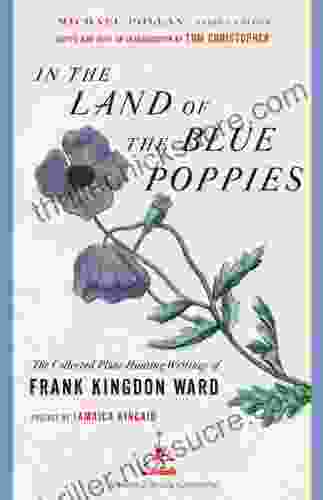
 Dillon Hayes
Dillon HayesIn The Land Of The Blue Poppies: A Literary Journey to...
Prologue: A Tapestry of...

 Eliot Foster
Eliot FosterCollege University Writing Super Review Flash Card Books:...
College University...
5 out of 5
| Language | : | English |
| File size | : | 2625 KB |
| Text-to-Speech | : | Enabled |
| Screen Reader | : | Supported |
| Enhanced typesetting | : | Enabled |
| Word Wise | : | Enabled |
| Print length | : | 324 pages |
| Lending | : | Enabled |


